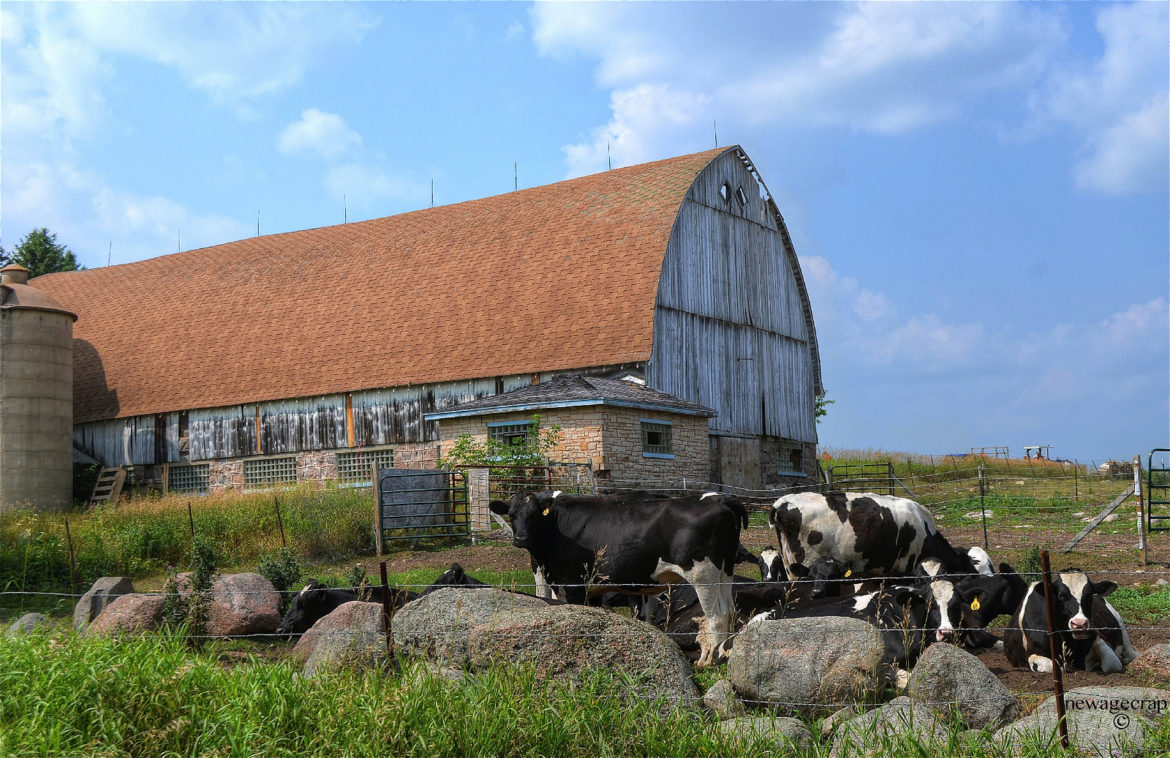Wisconsin Dairy Farmers Need Immigrants
Providing 70% of labor force on dairy farms and filling many other jobs.

A dairy farm in Wisconsin. Photo by William Garrett / Creative Commons.
While Republican politicians were busy spreading lurid stories about immigrants bringing chaos, violence and economic harm to communities across the Midwest, organizers of last week’s World Dairy Expo were quietly adjusting their program to offer programs in Spanish for employees and managers who play a crucial role in the industry.
Workers from Mexico and other Latin American countries make up an estimated 70% of the labor force on Wisconsin dairy farms. Over the last several years, the annual dairy expo in Madison has been responding to the needs of these workers, as well as to visitors from Spanish-speaking countries around the world, with the “expo en español.”
On Wednesday afternoon Juan Quezada, director of training and development at Milk Source LLC, gave a lecture on leadership entirely in Spanish. (Other Spanish-language sessions this year concerned women in dairy, animal welfare and labor retention.)
The meeting room inside the Alliant Center was full of Latino farm managers, some from as far away as Spain and Ecuador and others from nearby dairy operations in Wisconsin. Outside, the fairgrounds hosted people from 130 countries and more than 2,500 cows, exhibits showing off gleaming farm equipment, and aisles of food vendors.
The expo declined an offer to appear from Republican presidential candidate Donald Trump.
“We host an event for cows and people who care for cows and not for candidates,” Lisa Behnke, communications manager for World Dairy Expo, told Wisconsin State Farmer, who added that the same decision would apply to any partisan candidate. “We’re staying in our lane.”
But given Trump’s attacks on immigrants, and the promise of a “mass deportation” that, if it ever happened, would destroy the dairy industry overnight, the Republican presidential candidate would have been a particularly bad fit for the expo this year.
“We’ve seen a big population of Latinos coming to these events,” said Alison Pfau, bilingual regional dairy educator for the University of Wisconsin Extension, explaining the decision to offer programs in Spanish.
It stands to reason that immigrants, who are the backbone of the dairy industry, are moving into leadership positions, training and supervising workers, keeping operations running smoothly, becoming trusted managers on farms that lean heavily on them to survive.
In his lecture, Quezada told his own story, how he moved up from milking cows to management after a long apprenticeship. He described how he got a big break one day, while leading a tour of international visitors on the large farm where he was working. As he was giving the tour, he stopped now and then to pick up bits of garbage. When the tour was over, a farm manager from Europe asked if he would like to work overseas. His attention to detail and care for the little aspects of the job caught his prospective employer’s eye and led to his next job in Denmark. “Thanks to the garbage, I achieved one of my dreams,” he declared. Eventually, Quezada made it back to Wisconsin to work at Milk Source, the largest single milk-producer in Wisconsin.
It was one of many anecdotes about leadership qualities — honesty, punctuality, respect — that Quezada expounded on to his audience, mostly broad-shouldered Latino men wearing baseball caps, who nodded in agreement.
How many immigrant workers have come to this country and arrived in our state following Quezada’s path, I wondered — working hard, keeping their heads down and slowly becoming an indispensable part of our economy and society?
Last week the Immigration Research Initiative in New York and the Economic Policy Institute in Washington, D.C., co-released a one-page infographic showing how immigration benefits the U.S. economy.
Together, immigrant workers and business owners generated $19 trillion in economic output in the U.S. in 2022, the groups reported.
In addition to their outsized role in agriculture, immigrants, who make up 14% of the U.S. population, are 27% of janitors, 37% of construction laborers, 47% of maids and 46% of software developers.
On the rooftops of houses, above the Trump/Vance signs displayed in some of my neighbors’ yards, teams of Latino workers have been busy lately, hammering away to Reggeaton music as they replace hail-damaged roof tiles. It’s astounding how much work is getting done by immigrants even as the toxicity of anti-immigrant rhetoric keeps ramping up.
“When immigrants move to the United States, the economy grows,” the Immigration Research Initiative and EPI researchers found. “That doesn’t mean fewer jobs; it means more jobs: there are more consumers, more workers and more business owners. Study after study shows there is no fixed number of jobs in the economy. Immigration creates opportunities that benefit U.S.-born workers, too.”
Quezada’s lecture emphasized both the importance of hard work — an easy sell to his audience, which knows a lot about that topic — and the responsibilities that come with leadership. Leadership means setting an example, he told the group. It means thinking about how your speech and actions create a positive or negative atmosphere for others. It means listening well, inspiring people to follow your example, being consistent by saying hello every day.
When he asked for examples of leadership qualities from audience members, they offered more: respect, good communication skills, the ability to control your emotions.
Quezada told a story about how he lost his temper once, the night before he was about to be promoted to a new job. A cow gave birth unexpectedly and he had to stay in the barn late on a Sunday night. Angrily, he kicked the wall, only to find that his employer was standing behind him. He could have lost his promotion, he said. He told the story to illustrate another quality of good leaders: integrity — doing the right thing even when you think no one is watching.
I can think of a few political leaders who would benefit from Quezada’s lessons in leadership. But they’d need a translator to help them understand.
Ruth Conniff is Editor-in-chief of the Wisconsin Examiner
Forget the lies and slander. Wisconsin dairy farmers know they need immigrant workers was originally published by Wisconsin Examiner.
Op-Ed
-
Wisconsin Candidates Decry Money in Politics, Plan to Raise Tons of It
 Dec 15th, 2025 by Ruth Conniff
Dec 15th, 2025 by Ruth Conniff
-
Trump Left Contraceptives to Rot; Women Pay the Price
 Dec 8th, 2025 by Dr. Shefaali Sharma
Dec 8th, 2025 by Dr. Shefaali Sharma
-
Why the Common Council’s Amended Budget is Good Policy for Milwaukee
 Nov 20th, 2025 by Alds. Marina Dimitrijevic and Russell W. Stamper, II
Nov 20th, 2025 by Alds. Marina Dimitrijevic and Russell W. Stamper, II




















I am kind of conflicted between the two evils, Trump and the demonization of immigrants and the exploitation of immigrant labor by the employer. What would be wrong with required worker citizenship so Trump’s argument is moot as we wouldn’t have industries built on exploited immigrant labor? If the worker doesn’t want citizenship then find someone who does. Neither political party seems to want this, but they are smarter than me and I am too stupid to see my own flawed logic I guess.
Some of the industries employing illegal immigrant labor include slaughterhouses.
Illegal immigrants keep the salaries low – they are illegal and have no standing to complain about being exploited.
Politicians would have to fight the owners of these businesses who benefit so much from illegal immigrants.
Money talks